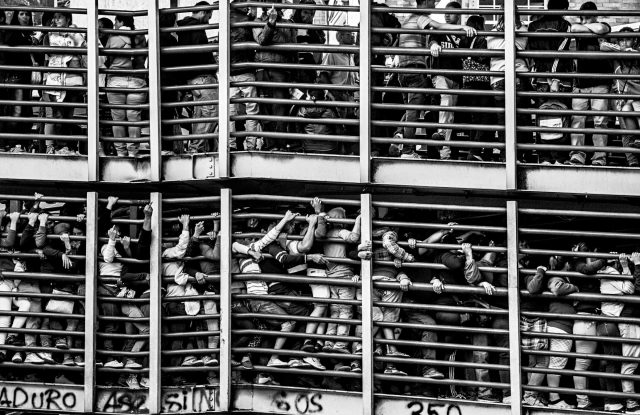Depredation
… The story of the oil bonanza is inscribed on the land around Lake Maracaibo, and on the lake itself. It’s an enormous shallow estuary, five thousand square miles, in the hot, dry, northwest corner of Venezuela … Oil leaks from the pipelines shine in gassy, muted rainbows. The leaks have reportedly multiplied since Chávez nationalized seventy-six oil-services companies, in 2009. The government blames the leaks on “sabotage.” Far more likely, they stem from lack of maintenance and from the depredations of thieves, who work the lake in boats.
(/ˌdɛpɹəˈdeɪʃən/)
Noun
1. A raid or predatory attack; an act of plunder.
2. An act of consuming agricultural resources (crops, livestock), especially as plunder.
Duckweed
… [Lake Maracaibo is] an enormous shallow estuary, five thousand square miles, in the hot, dry, northwest corner of Venezuela. Forty-three billion barrels of oil have been pumped from the Maracaibo Basin since 1914. Rusting tank farms line the shores of the lake. Petrochemical complexes glitter in the brushlands at night. Oil platforms, many of them abandoned, stud the lake’s surface. Snaking across the lake’s bottom are fifteen thousand miles of pipeline. The water is dense with sulfates, fluoride, nitrogen, detergent, fecal coliform. Huge blooms of noxious duckweed look, from above, like pea-green wigs spread out in the sun.
(/dʌk wiːd/)
Noun
1. Any of several reduced floating aquatic plants in the subfamily Lemnoideae that float on the surface of ponds.
Ahistorical
… Understanding Venezuela’s failing state as just another failure of socialism, and of statism generally, is ahistorical. Venezuela before Chávez was often extravagantly statist. Corruption has been a major problem in every era. Even dire food shortages are not new. These things happened under capitalism, too, as did intense political repression. The predatory state, the extreme insecurity, the sheer weakness of the rule of law—these are problems more profound, at this stage, than a traditional left-right analysis can clarify, let alone begin to solve.
(/ˌeɪhɪˈstɔɹɪkəl/)
Adjective
1. Lacking historical perspective or context.
Wan
…One hears persistent talk about how Maduro is besmirching the military’s dignity with his economic failures. The subtext is a wan hope that the military will step in, perhaps by forcing Maduro to follow the law and hold the recall election. No one says this in public.
(/wɒn/)
Adjective
1. Dim, faint
2. Pale, sickly-looking
3. Bland, uninterested
Besmirch
… Liendo, who was once a conscript, told me, “The military loses respect when you see soldiers selling potatoes and onions at the side of the road.” One hears persistent talk about how Maduro is besmirching the military’s dignity with his economic failures. The subtext is a wan hope that the military will step in, perhaps by forcing Maduro to follow the law and hold the recall election. No one says this in public.
(/bɪˈsmɜːtʃ/)
Verb
1. To tarnish something, especially someone’s reputation; to debase.
2. To make dirty; to soil.
Mensch
…People were nostalgic for the era of bourgeois democracy, for a Venezuela that worked. Not a soldier, not a raving messiah in a red beret, but a mensch in a baggy business suit who knew how to run a government.
(/mɛntʃ/)
Noun
1. A person of strength, integrity and honor or compassion.
2. A gentleman.
Wiry
… lores. The headliner at the union hall was Henry Ramos Allup, the leader of the National Assembly and the head of the Democratic Action Party. A slight, wiry man in his seventies, with big eyeglasses and a gray brush cut, he is a throwback to the pre-Chávez era. Democratic Action was one of the two parties that had traded the Presidency back and forth for
(/ˈwaɪəri/)
Adjective
1. Thin, muscular and flexible.
Unwary
… Lufthansa left in June, swallowing a loss of more than a hundred million dollars. American Airlines wrote off more than half a billion dollars in Venezuela earlier this year. At the Caracas airport, unwary travellers are robbed, and worse, by taxi-drivers. The sensation of being monitored—by suspicious officialdom, by scammers, by predators—is thick in the airport. But a mood of grief is thicker still.
(/ˈʌn.wɛəɹ.i/)
Adjective
1. Lacking caution as a result of naïveté or inexperience
2. Unprepared; not watchful
Foretaste
… In 2008, when the global financial crisis battered the oil price, Venezuela got a foretaste of the current crisis. The Army was put in charge of food distribution. Soldiers are not trained to understand the global supply chain. Supermarkets emptied, people went hungry, and food ended up on the black market. Later, a hundred thousand tons of food was found rotting in warehouses at the ports.
(/ˈfɔɹteɪst/)
Noun
1. A small example of something before it occurs
2. A taste of things to come
Trenchant
… [Lorenzo] Mendoza, who is fifty-one, studied engineering at Fordham and management at M.I.T. Forbes estimates his net worth to be $1.5 billion. He rarely gives interviews, or speaks publicly, but when he does defend himself or his company he can be trenchant. After Maduro accused Polar of failing to produce enough corn flour, Mendoza publicly offered to lease from the government some of the corn-flour plants it had seized from other companies. Polar could produce far more than the state did, he said. Nobody seemed to doubt that assertion.
(/ˈtrɛnʃənt/)
Adjective
1. Keen; biting; vigorously effective and articulate; severe.
Campesino
… “We first heard of Chávez in 1992, when he attempted the coup,” she said. “My husband and I started studying his words. From jail, he was sending out strategic lines, about Venezuela’s whole situation—historical, economic, national, international. It was a complete analysis, from 1811, more than twenty constitutions. He was very wise. And we were convinced: This is the man. He was a campesino, very simple. Everybody would be equal. We started working for his release.”
(/ˌkɑm pɛˈsi nɔ/)
Noun
1. An agricultural worker in Latin America.










